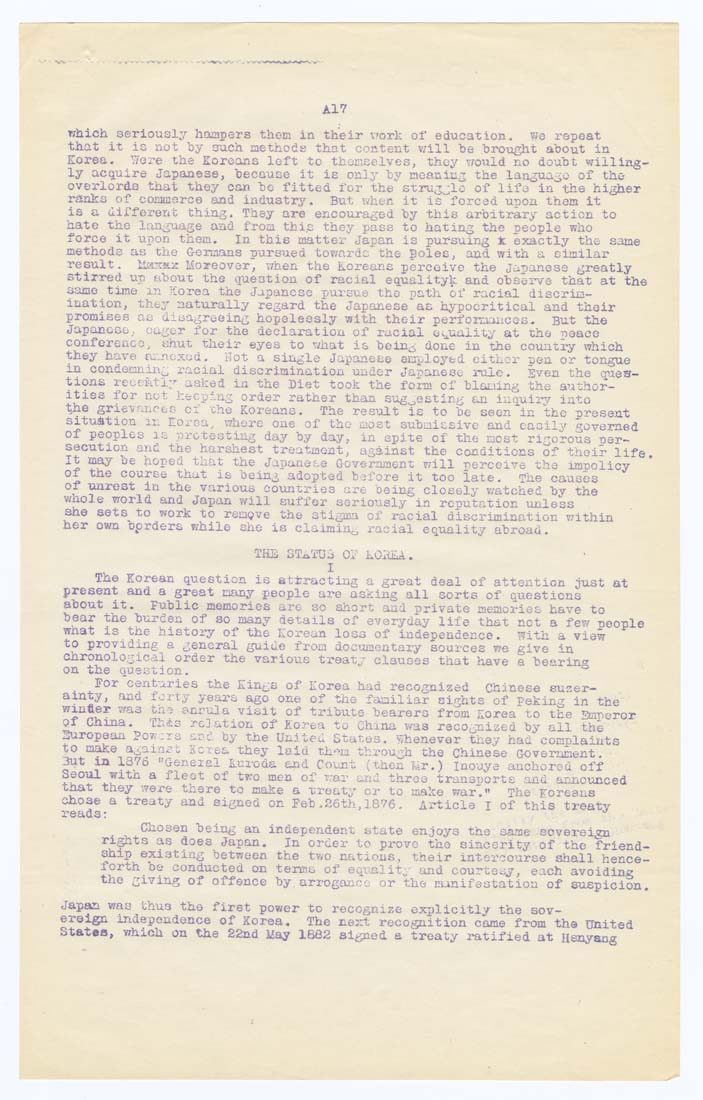A17
which seriously hampers thom in their VTork of education. VJe repeat
that it is not by such methods that content will be brough't about in
Korea. V/ore the Koreans loft to themselves, thoy would no doubt willing¬
ly acquire Japanese, because it is only by moaning the language of thc-
overlords that they can bo fitted for the struggle of life in the higher
riSnka of commerce and industry. But when it is forced uDon them it
is a different thing. They are encouraged by this arbitrary action to
hate the language and from this they pass to hating the people who
force it upon them. In this matter Japan is pursuing t exactly the same
methods as the Germans pursued towardo the Boles, and with a similar
result, lla^mx Moa-eover, when the Koreans perceive the Ja-oaness greatly
stirred up about the question of racial equalityk and obsei-ve that at the
same time m Korea the Japanoae pursue the path of racial discrim¬
ination, they naturally regard the Japanese as hypocritical and their
promises aa disagreeing hopelessly with their perfomauooa. But the
Japanoae, eager for the declaration of racial ecpiality at the Tiaace
conference, ahut their eyes to what ia being done iu the cotmtry which
they have Piincxod. Hot a single Japanese employed oithor pen or tongue
in condemning racial discrimination under Ja-oanese rule. Even the ques-
■tions recently asked in the Diet took the form of blaLiing the author¬
ities for not keeping order rather than sug^^esting an inquiry/ into
'^he grievances oi the Koreans. The result is to be seen in the present
situitiou m Korea, where one of tho most submissive and easily ^^ovemed
of peoples IB protesting day by day, in spite of the most rigorous per¬
secution and the harshest treatment, against the conditions of thoir life.
It may be hoped that the JaTJane5.e Government ¥fill nerceive tho impolicy
of the course that is being adopted before it too late. The causes
of unrest in the various countries are being closely watched by the
Whole world and Japan will suffer seriously in ronutation unless
she sets to work to remgve the stigma of racial discrimination within
her own bprders ?/hile she is claiming, racial equality abroad.
THE STATU 3 02 LOIiiiA.
The Korean question is attracting a great deal of attention just at
present and a great many people are asking all sorts of questions
about it. Public memories are so short and private memoriea have to
bear the burden of so many details of everyday life that not a few people
what IS the history of the Korean loss of independence. With a view
to providing a general guide from documentary sources we give in
chronological order the various treaty clauses that have a bearins
on the question. °
For centuries the Kings of Korea had recognized Chinese suzer¬
ainty, .and forty years ago one of the familiar sights of Peking in the
winfler waa tne anx'ula visit of tribute bearers from Korea to the Emperor
Of China. Thas relation of Korea to China v/aa recognized by all the
European ?ow:ra and by the United States, 'flheuever they had complaints
to make again£t Sorea they laid th«m through the Chinese Government.
3ut in 1376 "Geneiel Kuroda and Cotmt (then lir.) Inouya anchored off
r?°?'.,.f^''' * fleet of two men of war and three transT)orts and armounoed
that they were there to make a treaty or to make war"." The Koreans
chose a treaty and signed on Feb .26th,1876. Article I of this treaty
_ Chosen being an independent state enjoys the same sovereign
rights as does Japan. In order to prove tho sincerity of the friend¬
ship existing between the tv/o nations, their intercourse shall hence-
lorth be conducted on terms of eqiialit;- and courteay, each avoiding
tho giving of offence by arrogance or the manifestation of suspicion.
Japan was thus the first power to recognize explicitly the sov¬
ereign independence of Korea. The next recognition came from ths United
States, which on the 22nd May 1882 signed a treaty ratified at Hsnyang
|








